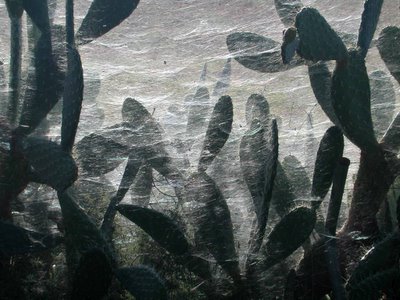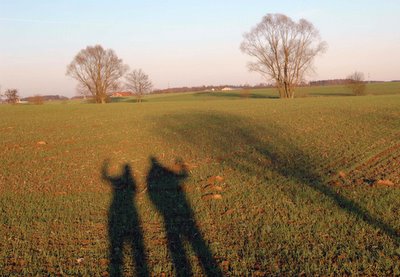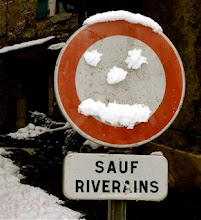skip to main |
skip to sidebar

If at first you don't succeed...
Today is the birthday of Montaigne, the great essayist. Most certainly even considered THE greatest by his French compatriots (stick an "e" between the "t" and "s" and it's already French, people!). In fact, in his official portrait, former French president Mitterand holds an open copy of the Essays in his hands.
Montaigne is considered to be the inventor of the personal essay. He published a book titled Essais in 1580. He was the first person to call short pieces of prose "essays" from the French word for... oui, attempt!...try, try and try again.
Yes, the mantra for anyone attempting to learn anything when things don't go right, right away, will now remind me of Montaigne. This, in turn, offers me a course of action by association: If I can't get it right and I'm tired of trying- I'll just write about it!
essayer = to try
un essai = an attempt
Photo: Try our delicious sandwiches
au Nouveau-Mexique, en septembre 2001

For weeks I was happily fumbling about in the French present with limited forays into one sort of past (passé composé) and a only a peek at the "going to..." future (futur proche). Then suddenly my teacher ripped me out of my present happiness and dragged me at mach 5 across the french timelines further into the land of tohu-bohu (yep- sounds exactly what I'm talking about: confusion)!présent (equivalent to three different English tenses)passé composé (equivalent to three different English tenses)imparfaitfuturfutur procheTo be quite frank, I'm just getting a grip on the present. I am content with limited retrospection and not having to worry about what lies ahead, in any language.Here I am with the the possibilities of articulating my past, present and future with a dizzying array of endings in French. Go ahead, ask me a question in any tense!
So what DO I do with la question du jour: Quels sont vos plans pour ce week-end? Brave on and answer resolutely with I will or I am going to? No, mes amis, I stay firmly rooted in the comfortable présent and hope for the best:Mes plans ce week-end est de me soigner.J'espère avoir une bonne journée avec une "presque-tout-petit déjeuner"!!J'espère regarder un bon film, peut-être même un film français. Je veux aussi faire la grasse matinee.Bon weekend tout le monde!...and hoping is one way of sneaking out of conjugating the future, oui?
Je espère = I hope
Photo: On the grounds of Hacienda la Boticaria
à Alcála de Guadaira, le premier de l'an dans 2006
 I took a week off from my French lessons but was lucky enough to have a surprise chance to interact with French speakers in Genève, Switzerland. I tagged along on a drive that took six hours round-trip for a meeting that didn't quite last as long as our coffee stops.The meeting was a tour of the company in French and English. There wasn't much for me to do but smile and nod, "oui":Oui, I understood a French word you said about 3 sentences agoOui, I understand your English very wellOui, très bien- fantastic work!It was all really quite impressive. Especially since the company representatives continued to speak in French to me, too despite the fact that I was basically monosyllabic and repetitive in French. No doubt I was a "yes-man" of sorts that day: weak in my French and totally agreeable to whatever was being said. But not all bèni-oui-oui are like that!
I took a week off from my French lessons but was lucky enough to have a surprise chance to interact with French speakers in Genève, Switzerland. I tagged along on a drive that took six hours round-trip for a meeting that didn't quite last as long as our coffee stops.The meeting was a tour of the company in French and English. There wasn't much for me to do but smile and nod, "oui":Oui, I understood a French word you said about 3 sentences agoOui, I understand your English very wellOui, très bien- fantastic work!It was all really quite impressive. Especially since the company representatives continued to speak in French to me, too despite the fact that I was basically monosyllabic and repetitive in French. No doubt I was a "yes-man" of sorts that day: weak in my French and totally agreeable to whatever was being said. But not all bèni-oui-oui are like that!
Photo: Wooden totem poles representing gods who supposedly live in the big shrine tree.
Seen at the Korean Folk Village à Suwon en Corée, en octobre 2003

I have just learned that, in French, a relative by marriage is basically a beautiful thing. What I plainly refer to in English as my parents-in-law or in-laws translates to beaux parents or belle-famille.
ALL the new members of the French family are lovely:
beau-père
belle-mère or belle-maman
belle-soeur
beau-frère (which can be shortened to beauf)
And in the eyes of your beautiful in-laws, YOU are...? Suddenly, there is a choice. Either they find you beautiful as well: belle-fille or beau-fils or they just acknowledge you as "the spouse of my child". In which case you are either a bru (daughter-in-law) or gendre (son-in-law).
And your own parents, brothers and sisters? There is no French adjective to automatically beautify their existence. I suppose this is not a problem as most of us have already spent enough time with our own family that, well, other adjectives quickly come to mind.
Photo: en Allemagne du Sud, en novembre 2004

Uhm actually, just help me.I am adrift in a sea of my French babblings. I am to describe a picture for mes devoirs. My teacher has given me a diving board of great beginnings from which to show off how much French I've learned and to demonstrate my understanding of the works of art she's chosen: Je me rends compte... Je m'aperçois que... Il se dégage une impression de... La scène est captivante grâce à...Jump! Jump! Jump! But I can't quite complete these sentences. I cannot say in French what I realize or perceive. I cannot say what sort of impressions the picture radiates nor why the scene is captivating. Not yet, not today. Peut-être demain, je suis optimiste.Instead of jumping into the deep end of confusing French (le français confus? compliqué? embrouillant?) I call out mayday, mayday, m'aider or m'aidez!
Oh, oui- the international distress signal is just us English speakers mispronouncing French (again!). The mispronounced m'aider or m'aidez is used to call for help in life-threatening situations. In the US it's a federal crime to cry a wolfy mayday with punishments of up to six years imprisonment and a fine of $250,000. In French, pronounced correctly, it loses its sense of extreme urgency and is, as in English, a request for help.With that in mind, I stick to French but with an independent American attitude:
je m'aide. I help myself. I go back to the shore of my basic knowledge. I wade in the comfort of simply attempting to say what is there and how it looks: Il y a une sculpture, un homme...Il est orange, très mystérieux...
Photo: Récif de la Grande Barrière d'Australie, en novembre 2004

Je t'aime.
Those three words (posing and sounding as two) make a lot of people swoon. Those are words of love! Well... not only.
Pre-French-Class I thought that Je t'aime was akin to a marriage proposal.
Je t'aime. I love you, he says and you say it back and voila you are one step nearer that altar. Well, okay- not in France.
In France, they fully understand the meaning of aimer: to love or to like. Oui! Let's rewind to that summer of love in France- "Je t'aime," he said over and over but after the summer it was "au revoir" or maybe the heavenly farewell "adieu." You were crushed. No phone calls or letters when autumn came. Winter was indeed very cold.
That summer of love- it was maybe just the summer of like.
Photo: Swiss National Day, Feux d'artifice over Basel
minuit, en juillet 2005










